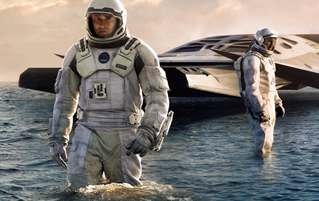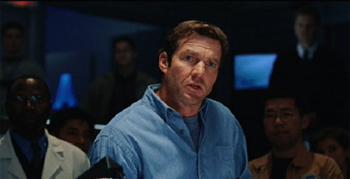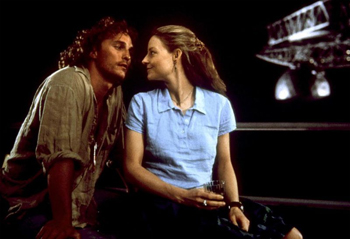5 'Scientific' Movies That Actively Hate Science

Science fiction is a genre which you'd expect to hold science in high regard. After all, how would we get robots and jetpacks without a generous slathering of scientific knowledge? But as it turns out, there are several wildly successful (and some less successful) science fiction films which convey the message that, in the end, science is total whale shit. For example ...
Jurassic Park Thinks Science Is An Affront To God

Jurassic Park is a movie about science, starring scientists, written by a scientist. And man, does it ever think that science is a big piece of shit.

Quite obviously, the moral of the film is that hubris (specifically, the kind that makes you clone dinosaurs and fill an amusement park with them before you even know how to take care of them) is bad. The antihero is John Hammond, a leisure-suited billionaire with childlike enthusiasm for the possibilities of genetic science. Of course, all of the main protagonists are reasonably sure that this whole "resurrecting dinosaurs" thing is a bad idea, which the movie and its three sequels all illustrate using the helpful visual aid of dinosaur-related fatalities.
But the most consistently correct character in the film is Jeff Goldblum, playing Jeff Goldblum, a mathematician who has nothing but disdain for the scientific method. In one monologue, he describes scientific discovery as "a violent, penetrative act that scars what it explores. What you call discovery, I call the rape of the natural world." That's right -- Jurassic Park is a science fiction film that refers to science as a form of rape.
Hammond goes on to joke about how the only person on his side around a table of scientists is the "blood-sucking lawyer" -- who represents the careless pursuit of wealth, and incidentally is the first person to be eaten by a dinosaur. Later in the film, Goldblum's character continues to proselytize on the folly of science's inclination toward playing God -- at one point musing, "God creates dinosaurs, God destroys dinosaurs, God creates man, man destroys God, man creates dinosaurs."
None of these are scripted lines; they just let the camera roll.
Thing is, the folly of Jurassic Park was never the dinosaurs -- it's crooked and/or incompetent staff members who fucked up Zookeeping 101 and let the animals loose on the island to freely devour its inhabitants. The main characters' disdain shouldn't be directed at the momentous scientific achievement of cloning an extinct species, but at staffing your park with a bunch of jackasses who'd get fired from a carnival.

Christopher Nolan's huge space travel epic Interstellar was praised for how scientifically literate it was. Hell, the people working on it had to make new scientific discoveries in order to even make it, and very few filmmakers can put that on their resume. Given this, it's kind of surprising to notice that, if you pay attention, this movie kind of hates science.
When Matthew McConaughey and his crew are low on fuel and have to figure out which planet they should pick to colonize, Anne Hathaway's character thinks it should be the one currently inhabited by the guy she has a crush on -- simply for that reason. To defend her decision, she goes on a monologue about how the love transcends science and they should trust it above reason, because she really feels that it's the right move to go to Planet Boyfriend.
"Love is the one thing we perceive that transcends time and space. Well, that and radiation."
To McConaughey's credit, he overrules her and chooses the planet that the evidence suggests is the best bet. And sure enough, this decision leads to disaster, space murder, and the likely extinction of the human species.
Of course, it's fine for a character in a story to ignore reason and blindly pursue their own goals for selfish personal reasons, but it turns out Hathaway was right all along. Love truly does turn out to be more powerful than our silly notions of science. They double down on this theme when McConaughey plunges into a black hole and is somehow able to use his daughter's love to travel through time.
Granted, as soon as he wakes up in the future/present, he immediately abandons his daughter to go track down Anne Hathaway, but that's love, man.

The Day After Tomorrow Thinks We Should Listen To One Crazy Scientist Instead Of The Entire Scientific Community

Roland Emmerich's environmentalist explosion-fest The Day After Tomorrow was possibly meant as a serious warning to start treating the world with a little more respect, but it may have done more to hurt the global warming cause than help it. We understand Emmerich's plight -- global warming can be a pretty boring lecture, so you have to toss some wolves in there to keep things interesting.
"Wolves need CO2 to survive! It's only making them stronger!"
The real problem is that the movie super doesn't understand how climate change, or even basic science, works. Dennis Quaid stars as Jack, a climatologist whose studies show that runaway climate change is going to create a huge, planet-wide storm that will obliterate America, partly by specifically targeting its major monuments in a cunning display of strategy. Sadly, no one believes him, and the president and vice president dismiss him as a quack, which winds up dooming the nation. Boy, what a bunch of arrogant fart sacks, right? How could you ignore science?
But when you think about it, the conclusion the president and vice president reach (to not listen to Dennis Quaid) is extremely scientific. Because Dennis Quaid is a lone crackpot. Sure, he turns out to be right, but nobody has any good reason to take him seriously, because every other scientist they consult think he's crazy.

In the real world, the problem with global warming is that millions of scientists agree on it while politicians continue to treat it like a matter of debate, ignoring the overwhelming consensus of the scientific community. Now, if the opposite were true, and every single scientist on the planet thought global warming was baloney except for one dude, you'd kick that dude the hell out of the building, Dennis Quaid be damned. People can be absolute geniuses in one area and complete morons in another -- Ben Carson is one of the most accomplished neurosurgeons to ever live, and he thinks Hillary Clinton is an actual witch.
The conceit of the scientific community is that a theory is likely to be correct if lots and lots of scientists agree. It's called peer review, and if we didn't have it, then we'd wind up accepting all sorts of dangerous insanity as fact. So the line that sets the vice president up as the movie's villain -- "We can't evacuate half the country because one scientist thinks the climate is shifting" -- is in fact an example of perfectly correct scientific policy. All he's asking for is the opinion of more experts before throwing all of American society into total chaos.

But he's kind of a dick about it, so he is therefore the villain.
The Scientists in Contact Abandon An Alien Machine After A Single Test Because They Don't Believe Jodie Foster

Contact is generally held up as one of the most pro-science movies ever made, given that it was adapted from a novel written by Carl Sagan -- who was essentially the Mr. Rogers of the pop science world, since it's physically impossible to dislike him. It's about the struggle between science and religion, and settles on a kind of "Can't we kiss and make up" message that couldn't be made clearer than when Jodie Foster's scientist character, Ellie, has bridge-building sex with Matthew McConaughey's theologian character, Palmer. But although science is supposed to save the day in the end, you can't help but think that the scientists are the bigger dicks in this situation.

If you haven't seen it, the plot is about SETI (the Search for Extraterrestrial Intelligence) receiving a bona fide alien transmission containing instructions for building a giant machine. But nobody knows what the machine does, other than that someone is supposed to ride inside of it (it could be a transportation machine, or it could be a giant alien microwave at the center of an elaborate practical joke).
The government decides to spend a trillion dollars building the thing, and auditions are held to figure out who will pilot it. Initially, they choose the president's science advisor, Tom Skerritt, but on the day of the test, both Skerritt and the machine are blown to bits when a religious fanatic (played by Gary Busey's even crazier-looking son) suicide-bombs the project, because Jesus and aliens don't mix. Luckily, the government reveals that they secretly built another alien machine in Japan, and Ellie, a plucky radio astronomer working for SETI, is chosen to go through.

"A test pilot?! This could dangerous! Send one of the nerds."
Obviously, religion, made flesh in the sneering visage of Jake Busey, is supposed to be the villain here, but if you're scientifically minded, nothing that the science community does here makes much sense. For one thing, neither of the people they choose to go through the wormhole were astronauts. Skerritt was an advisor and Ellie is an astronomer. When the Apollo program decided to send people to the moon, they didn't send physicists; they sent fighter pilots. Because while Stephen Hawking might be the smartest guy on the planet, he's probably not the best person to choose to pilot the lunar lander. Ellie is really good at listening to radio transmissions and knows all the constellations, but that shouldn't make her a frontrunner to physically pilot a spacecraft to another world.

Dumb thing number two is that the climax of the film, in which Ellie goes on her journey, is the first and last time that anyone switches on the machine. The guys who finally landed on the moon were on Apollo 11. What, they ... weren't even going to test it first? They didn't toss a single monkey in there? Sure, the aliens might be confused, but that could be cleared up later. It would've also saved them one Skerritt.
And after Ellie comes back and recounts an admittedly implausible story about being whisked away to another planet to meet a shapeshifting alien wearing her father's skin, the scientists all unanimously decide she's crazy and scrap the project.

So ... they're not going to take another swing at it to make sure she's full of beans? After all, the whole project left a smoking $2 trillion crater in someone's wallet. Given that replicating results is one of the most fundamental rules of the scientific method, it seems weird that they'd nonchalantly dismantle the most expensive experiment ever built after one try and unilaterally dismiss the reports of the only person who ever tested it. But that's what they do, and that's the note the movie ends on -- exploring the vastness of space is a neat idea, but why bother trying to verify anything this crazy broad says?
The Happening Literally Says Science Is Pointless

Whatever fans M. Night Shyamalan still has left no doubt regard 2008's The Happening as the exact point where he lost his goddamn mind. It's a science fiction / horror movie with a thin environmentalist message about plants releasing a chemical that makes humans commit suicide, and it's practically the worst thing Mark Wahlberg has ever done, coming in right behind the time he went to prison for a hate crime.
"But I made a music video in which I make out with a black woman, so no harm done."
Wahlberg's character is a high school science teacher, which means his whole job is supposed to be educating the next generation on how cool science is. Unfortunately, he might be the worst human advocate science has ever had. In his introductory scene, he's talking to his students about colony collapse, the oft-cited phenomenon about decreasing honeybee populations in America. He asks his students if they can think up any reasons this might be happening. They give him a few standard possibilities -- disease, chemicals, global warming -- but Wahlberg knocks them all down as stupid answers erupting from the stupid mouths of stupid people. Then, after asking the class jock for his opinion (and insulting his face), the kid replies that it's "an act of nature, and we'll never fully understand it."

Instead of giving the kid an instant "F," Wahlberg replies that this is the correct answer, and that "science will come up with some reason to put in the books, but in the end, it will be just a theory, and it will fail to acknowledge that there are forces at work that are beyond our understanding."
Um ... what? That's the kind of argument creationists use to try to debunk science, not the thought-starter you'd expect a science teacher to toss to his students to get them excited about the field of discovery. Wahlberg is actively discouraging his students from taking an interest in science, because it's nothing but a bunch of theories on stuff nobody will ever truly understand.

In the film's climax, after the vegetable apocalypse abruptly ends without warning, a scientist appears on television to declare that science can't explain shit, and what we need is less sciencing and more standing around in ignorant awe of nature's majesty. You may recognize as the policy of prehistoric communities who worshiped the sun because they thought it would get angry and leave if they didn't.
For more Hollywood science that was pulled straight out of some screenwriter's ass, check out 5 Famous Sci-Fi Devices That Totally Ignore Actual Science and 5 Ways Movies Say You Can Die (That Science Says Are Wrong).
Subscribe to our YouTube channel, and check out 4 Horrible Ways We're Bringing Sci-Fi Technologies To Life, and other videos you won't see on the site!
Follow us on Facebook, and give us a big hug, please.